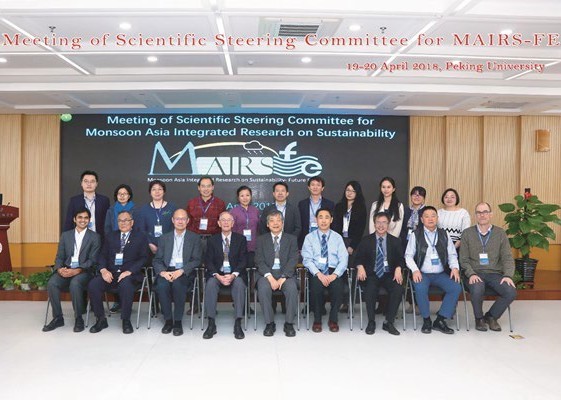A meeting of the Scientific Steering Committee (SSC) for Monsoon Asia Integrated Research on Sustainability – Future Earth (MAIRS – FE) was held at the College of Environmental Sciences and Engineering at Peking University, Beijing on 19 to 20 April 2018. The participants of the SSC meeting included academics and practitioners involved in science and policy research and project advisory services. The meeting involved review of activities related to three thematic research areas of MAIRS-FE namely Water-Energy-Food Nexus, Human Health, and Resilience to Natural Disasters, and discussion on the development of a roadmap for future activities.
The first session of the meeting included a welcome address by the Dean of College of Environmental Sciences and Engineering at Peking University, Professor Tong Zhu, an introduction of Future Earth by MAIRS-FE vice chair Professor Tetsuzo Yasunari, introduction of the Future Earth Regional Centre in Kyoto, Japan by Professor Hein Malle and a talk on history of MAIRS by the Chair of MAIRS – FE SSC, Professor Michael Manton. The next three sessions were dedicated to presentations by invited participants from India, China, Malaysia, Thailand, and Mongolia on the three thematic areas of MAIRS – FE. The participants discussed activities developed by the organizations they represent and potential collaborative opportunities with MAIRS – FE.
Aditya Kaushik, a project scientist at Divecha Centre for Climate Change was invited to speak on the Water-Energy- Food nexus. Aditya gave a brief overview on the Water-Energy-Food nexus in Bangalore, specifically talking about skewed supply-demand ratio, wastage of water, over exploitation of ground water use, problem of power generation, use of expensive energy -intensive means to import water, and impact of pollutants on food production. He introduced the newly-instituted Water Solutions Lab, a major project of the Future Earth regional office, as a platform to generate sustainable and practical solutions to the complex and multidimensional problems resulting from the Water-Energy-Food nexus. Aditya also spoke about some activities that will be undertaken by the Water Solutions Lab, such as the workshop on water quality to be held on 20 and 21 June 2018, and the workshop on Urban Floods to be held from 27 to 29 June 2018. He concluded the presentation by describing how Divecha Centre can contribute to each of the three thematic areas of MAIRS – FE and specifically suggested conducting a joint comparative study exercise on the cities in the region. For example, a study on Bengaluru and Beijing on how the two cities survive the present, how they are planning for their water futures, and what the cities can learn from each other.
The fifth session included presentations on Modelling and Observations. Participants discussed Earth system modelling techniques, regional climate downscaling techniques, and large sensor networks to acquire data on air pollution. The final session was dedicated to developing a roadmap for future activities. It was decided to expand the original three thematic areas to include a fourth one on Modelling and Observation which would act as a link to other areas. A working group of participants from each area was created to identify the scope of future MAIRS-FE activities, links to other areas, roles of the two program offices, source of potential funding opportunities, types of long term and short term activities and potential leadership groups. Finally, it was also announced that Professor Tong Zhu would be the new chair, and that Professors Satheesh and Jiaguo Qi would act as new vice chairs of MAIRS-FE.
